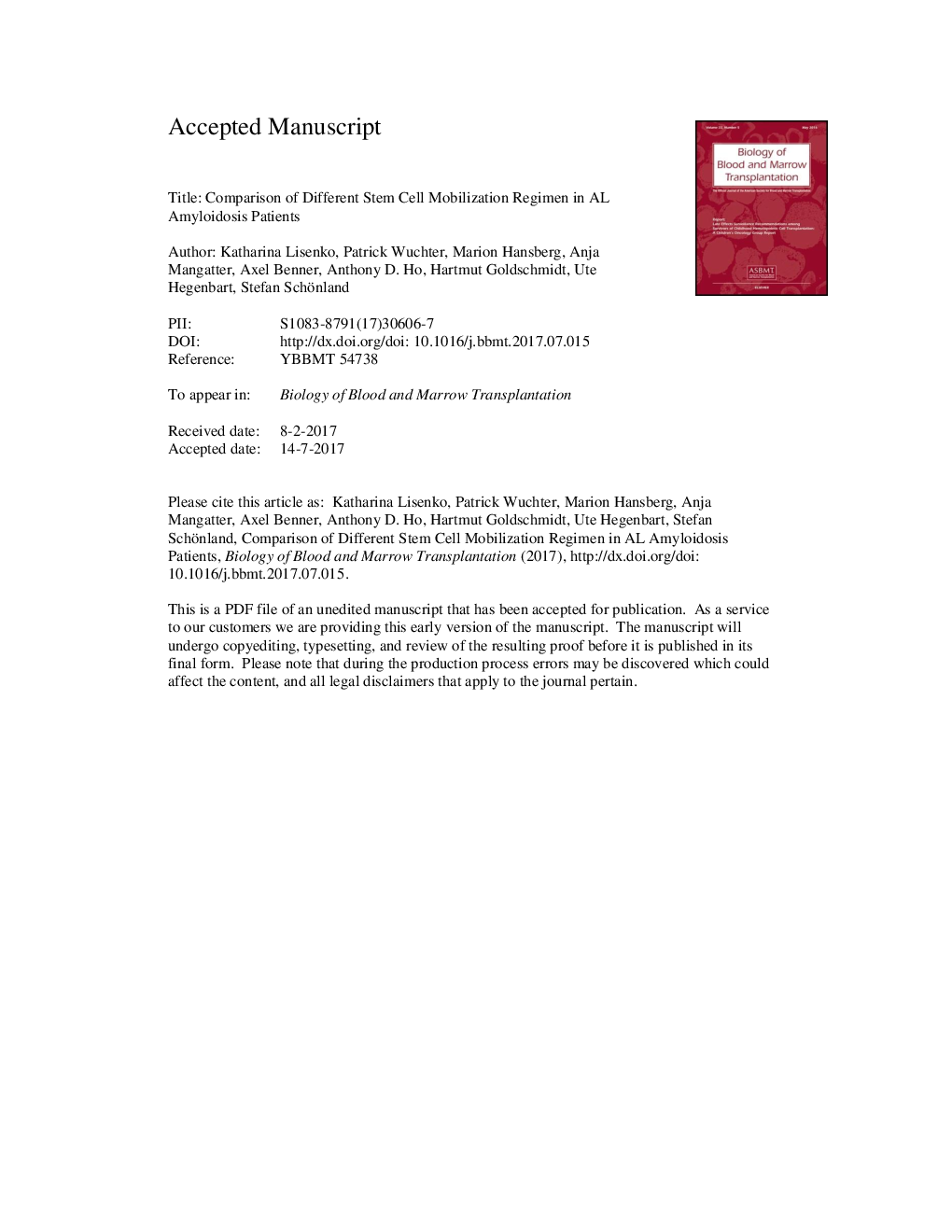| Article ID | Journal | Published Year | Pages | File Type |
|---|---|---|---|---|
| 8430801 | Biology of Blood and Marrow Transplantation | 2017 | 33 Pages |
Abstract
High-dose melphalan (HDM) and autologous blood stem cell transplantation (ABSCT) is an effective treatment for transplantation-eligible patients with systemic light chain (AL) amyloidosis. Whereas most centers use granulocyte colony-stimulating factor (G-CSF) alone for mobilization of peripheral blood stem cells (PBSC), the application of mobilization chemotherapy might offer specific advantages. We retrospectively analyzed 110 patients with AL amyloidosis who underwent PBSC collection. Major eligibility criteria included age <70 years and cardiac insufficiency New York Heart Association â¤III°. Before mobilization, 67 patients (61%) had been pretreated with induction therapy, including 17 (15%) patients who had received melphalan. Chemo-mobilization was performed with either cyclophosphamide, doxorubicin, dexamethasone (CAD)/G-CSF (nâ=â78, 71%); ifosfamide/G-CSF (nâ=â14, 13%); or other regimens (nâ=â8, 7%). AL amyloidosis patients with predominant heart involvement and/or status post heart transplantation were mobilized with G-CSF only (nâ=â10, 9%). PBSC collection was successful in 101 patients (92%) at first attempt. The median number of CD34+ cells was 8.7 (range, 2.1 to 45.5)âÃâ106 CD34+/kg collected in a median of 1 leukapheresis (LP) session. Compared with G-CSF-only mobilization, a chemo-mobilization with CAD/G-CSF or ifosfamide/G-CSF had a positive impact on the number of collected CD34+ cell number/kg per LP (Pâ<.001, multivariate). Melphalan-containing previous therapy and higher age had a significant negative impact on quantity of collected CD34+ cells. Median common toxicity criteria (CTC) grade of nonhematologic toxicity was II (range, 0 to IV). Life-threatening CTC grade IV adverse events were observed in 3 patients with no fatalities. Cardiovascular events were observed in 17 patients (22%) upon CAD/G-CSF mobilization (median CTC: grade 3; range, 1 to 4). Toxicity in patients undergoing ifosfamide/G-CSF mobilization was higher than in with those who received G-CSF-only mobilization. HDM and ABSCT were performed in 100 patients. Compared with >6.5âÃâ106 transplanted CD34+ cells/kg, an ABSCT with <3âÃâ106 CD34+ cells/kg was associated with a longer duration to leukocyte reconstitution >1 à 109/L and a reduced platelet count <150 à 109/L 1 year after ASCT. Our results show that CAD chemotherapy is very effective in PBSC mobilization and has a tolerable toxicity profile in AL amyloidosis patients. A further toxicity reduction by omission of doxorubicin might be considered. Because of advanced nonhematologic toxicity, ifosfamide administration cannot be recommended. However, G-CSF mobilization alone is also safe and effective. Considering the hematopoietic reconstitution and long-term stem cell function, our results provide a rationale to collect and transplant as many as >6.5âÃâ106 CD34+ cells/kg, if feasible with reasonable effort.
Related Topics
Life Sciences
Biochemistry, Genetics and Molecular Biology
Cancer Research
Authors
Katharina Lisenko, Patrick Wuchter, Marion Hansberg, Anja Mangatter, Axel Benner, Anthony D. Ho, Hartmut Goldschmidt, Ute Hegenbart, Stefan Schönland,
